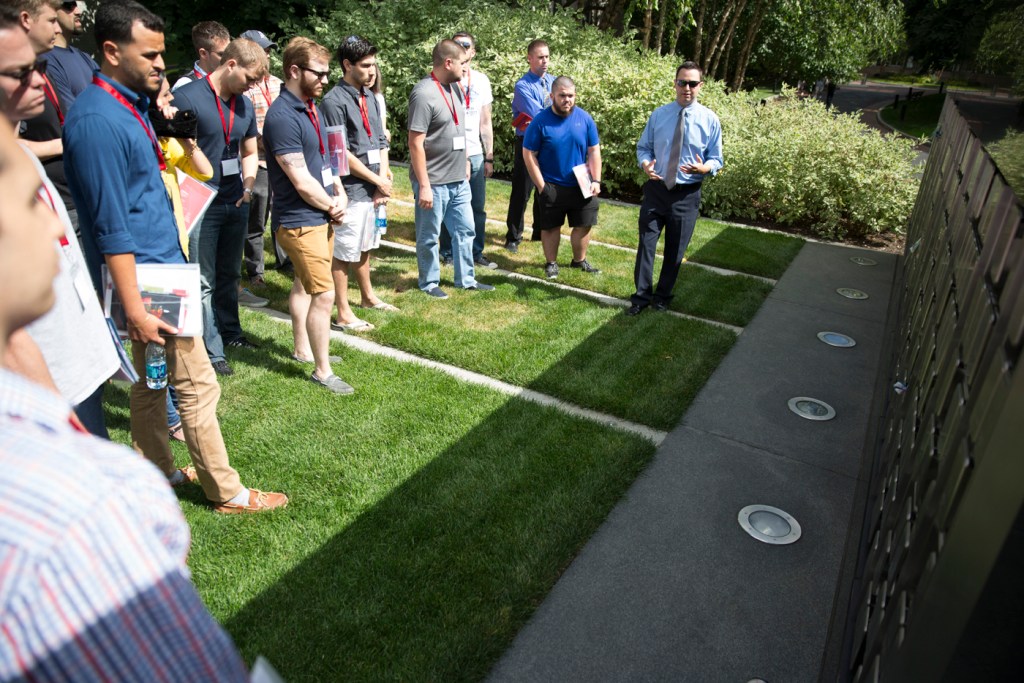New student veterans receive advice, share stories

A score of new student veterans filed into a meeting room on the third floor of the Curry Student Center on Friday afternoon, looking to unwind after a daylong series of workshops, information sessions, and campus tours.
They had spent the previous six hours learning the ins and outs of their education benefits; getting the lowdown on campus resources; and meeting with the leaders of Northeastern’s Student Veterans Organization. They had gone on a walking tour of campus, stopping first at Northeastern’s Veterans Memorial and then at Matthews Arena, where they learned this history behind the black chair paying tribute to prisoners of war and those who have gone missing in action. Now they had the chance to meet each other, to share military stories and swap plans for their futures over food and drink.
Kyle Beliveau, GSP’18, served in the Navy from 2007 to 2013, working as a mechanic in his aircraft carrier’s engine room. His homeport was located in San Diego, California, but his crew made monthly port calls, which afforded him the opportunity to visit Hong Kong, Thailand, Japan, and Bahrain. Sean Burgins, DMSB’18, served in the Navy from 2003 to 2011, working in an administrative role at the naval base in Yokosuka, Japan, and partaking in shore duty in Pensacola, Florida.
Beliveau, who will celebrate his 25th birthday on Friday, is currently enrolled in the general studies program, but has his sights set on entering the College of Engineering. He hopes to parlay his experience as a Navy mechanic into a career as a mechanical engineer. Burgins, 32, is enrolled in the business administration program, where he will focus on finance. He was a numbers whiz in the Navy, he said, and wants to apply his math skills to his civilian job.
Both bring a unique global perspective to the campus community, one honed by living and working around the world. “I think I have a more seasoned perspective than the typical civilian student,” Beliveau said. “I’ve worked with people from many different countries.” “We’ve seen and done things that civilian students don’t encounter,” added Burgins. “We’re better equipped to handle certain stresses.”

Matthew Gibbs, ’18, foreground, is one of 17 student-veterans in Northeastern’s 2014 entering class.
The majority of the new student veterans will participate in the federal government’s Yellow Ribbon Program, which operates in conjunction with the Department of Veterans Affairs and currently provides scholarships to more than 220 Northeastern student veterans who have served in the post-9/11 era. In 2009, the university pledged $2 million to help veterans earn a college education through the program, which offers students access to bachelor’s, master’s, doctoral, and law degrees.

The student veterans visited Matthews Arena, where they learned the history behind the black chair paying tribute to prisoners of war and those who have gone missing in action.
Beliveau and Burgins have enrolled in the program. “It’s a great opportunity for me,” Beliveau said. “More veterans should take advantage of it.” Burgins, for his part, had not even heard of the program until he applied to Northeastern, noting that he was thankful for the program’s tuition support.
In addition to the Yellow Ribbon Program, Northeastern offers student veterans a myriad of on campus resources as part of its longstanding commitment to supporting servicemembers. Andy McCarty, an Air Force veteran and the director of veteran and military services at Northeastern, noted that the university has developed a relationship with the Boston Red Sox and Massachusetts General Hospital Home Base Program, which serves veterans of the Iraq and Afghanistan wars who suffer from combat stress and traumatic brain injury. Clinicians from University Health and Counseling Services, he said, have been trained by experts within the program to notice the warning signs of TBI’s and post-traumatic stress disorder as well as how these challenges can affect a veteran’s academic experience.
“Student veterans come to school from different backgrounds and circumstances,” he said. “It’s important for them to know what kinds of services we provide.”
Laura Wankel, senior vice president for student affairs, echoed McCarty on Friday, telling the student veterans, “Everyone at the university is here to support you.”





